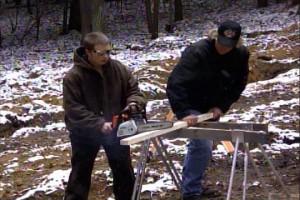Johnson Co. HS Students Give New Meaning To ‘Homework’
10/29/08 Morning Edition
http://www.tricities.com/tri/news/local/education/article/johnson_co_hs_students_give_new_meaning_to_homework/15635/
10/29/08 Morning Edition
http://www.tricities.com/tri/news/local/education/article/johnson_co_hs_students_give_new_meaning_to_homework/15635/
Before they can own a home some Johnson County High School students are building houses from the ground up.
George Triplett teaches residential construction, plumbing, carpentry, masonry and electrical courses at Johnson County High School. The veteran craftsman and educator says students learn lessons are worth more than a grade or money.
“We’re not in this for the money; we’re in it to teach students basic skills in carpentry, masonry, plumbing and electrical. Which will enable them to move on and find positions in our area,” said Tripplet.
JCHS students are laying the footers in a hollowed space sitting adjacent to two homes they previously built. The school system purchased 48 acres around the campus for students to construct homes now making up the Fairground Estates sub-division.
Approximately 120 students a day are laying the footers for their latest project on Hillcrest Road. The students are developing one-acre lots, but these can stretch to three to five acres based on the hilly lay of the land.
Triplett says construction jobs are one of the highest occupational demands facing Southwest Virginia, Northeast Tennessee and Western North Carolina, as more retirees look to relocate to the region from Michigan and Florida.
“We’re trying to provide a way that our students can earn a good living and stay within our community and continue to contribute to our community,” added Triplett.
“I think I learn it better getting hands on experience instead of just learning in the classroom,” said JCHS Senior Daniel Hightower.
Junior student Caleb Courtner helped build two houses through the classes. This third home is the first house he’s built from the ground up.
“I learned a lot about residential wiring… If you’re in a classroom and you mess up it’s not that big a deal you can go back and fix it, but working on a house it can cause a big problem,” added Courtner.
Triplett works with veteran construction instructor Tim Roberts to split up the task among the students throughout the day. Roberts donates construction machinery for the students to get the full hands on experience. Everyday, the students load a school bus with construction tools and supplies. They don coveralls and head up hill to their outdoor classroom.
“They have a lot of advantages and some of the credits that they gain from that course can be translated to some of these post-secondary schools,” said Triplett.
Much like Advanced Placement courses, Triplett says his students have a chance to earn academic credits for college. He says Johnson County High School has an agreement with Northeast State to accept credits in its plumbing and electrical programs. Past students have also accepted full scholarships to East Tennessee State University and Purdue University for construction technology programs.
Johnson County High School’s agricultural students have also been able to transfer many credits to Tennessee Tech for welding and various courses. Triplett says many of his students look toward Middle Tennessee, which has a masonry institute.
“I want them to appreciate the value of hands-on work, because that’s continuing to lag in contemporary society.” According to Triplett, the vocational courses encourage confidence in his students. Although he says he doesn’t expect every student to become an electrician, carpenter or mason.
“They’ll have the basic skills they need, eventually they will own their own homes. And then they’ll have the confidence to maybe approach or attack something that they never tried before.”
George Triplett teaches residential construction, plumbing, carpentry, masonry and electrical courses at Johnson County High School. The veteran craftsman and educator says students learn lessons are worth more than a grade or money.
“We’re not in this for the money; we’re in it to teach students basic skills in carpentry, masonry, plumbing and electrical. Which will enable them to move on and find positions in our area,” said Tripplet.
JCHS students are laying the footers in a hollowed space sitting adjacent to two homes they previously built. The school system purchased 48 acres around the campus for students to construct homes now making up the Fairground Estates sub-division.
Approximately 120 students a day are laying the footers for their latest project on Hillcrest Road. The students are developing one-acre lots, but these can stretch to three to five acres based on the hilly lay of the land.
Triplett says construction jobs are one of the highest occupational demands facing Southwest Virginia, Northeast Tennessee and Western North Carolina, as more retirees look to relocate to the region from Michigan and Florida.
“We’re trying to provide a way that our students can earn a good living and stay within our community and continue to contribute to our community,” added Triplett.
“I think I learn it better getting hands on experience instead of just learning in the classroom,” said JCHS Senior Daniel Hightower.
Junior student Caleb Courtner helped build two houses through the classes. This third home is the first house he’s built from the ground up.
“I learned a lot about residential wiring… If you’re in a classroom and you mess up it’s not that big a deal you can go back and fix it, but working on a house it can cause a big problem,” added Courtner.
Triplett works with veteran construction instructor Tim Roberts to split up the task among the students throughout the day. Roberts donates construction machinery for the students to get the full hands on experience. Everyday, the students load a school bus with construction tools and supplies. They don coveralls and head up hill to their outdoor classroom.
“They have a lot of advantages and some of the credits that they gain from that course can be translated to some of these post-secondary schools,” said Triplett.
Much like Advanced Placement courses, Triplett says his students have a chance to earn academic credits for college. He says Johnson County High School has an agreement with Northeast State to accept credits in its plumbing and electrical programs. Past students have also accepted full scholarships to East Tennessee State University and Purdue University for construction technology programs.
Johnson County High School’s agricultural students have also been able to transfer many credits to Tennessee Tech for welding and various courses. Triplett says many of his students look toward Middle Tennessee, which has a masonry institute.
“I want them to appreciate the value of hands-on work, because that’s continuing to lag in contemporary society.” According to Triplett, the vocational courses encourage confidence in his students. Although he says he doesn’t expect every student to become an electrician, carpenter or mason.
“They’ll have the basic skills they need, eventually they will own their own homes. And then they’ll have the confidence to maybe approach or attack something that they never tried before.”
***RELATED LINKS ***
Johnson County High School http://www.jchs.k12tn.net/
Johnson County High School Vocational Program http://www.jchs.k12tn.net/Vocational/vocationalschool.htm ###
Johnson County High School Vocational Program http://www.jchs.k12tn.net/Vocational/vocationalschool.htm ###
(Visited 34 time, 1 visit today)




 To blend or not to blend? That is the question
To blend or not to blend? That is the question

 Happy Veterans Day. I've worked with so many v
Happy Veterans Day. I've worked with so many v







 . I
. I 
 an excuse to dress up. This year's Hallow
an excuse to dress up. This year's Hallow
 It's the final day for early voting in Mar
It's the final day for early voting in Mar

![ME: Freddy Krueger freaked me out as a kid. But I also freaked out watching some scenes in "Pee Wee's Big Adventure."
VANCE: You should watch "Mr. Crocket" on @hulu .
ME: [[90mins later]] 😱😱 @vanceb_ WTF did I just watch? Throw the whole mentee away🤣.
#RealTalk this is a good fun watch for Halloween. There's definitely a sequel to this.](https://scontent.cdninstagram.com/v/t51.29350-15/465027074_452440240759091_3389237086542937148_n.webp?stp=dst-jpg&_nc_cat=111&ccb=1-7&_nc_sid=18de74&_nc_ohc=E8JeKLg2DUkQ7kNvgEDekMZ&_nc_zt=23&_nc_ht=scontent.cdninstagram.com&edm=ANo9K5cEAAAA&_nc_gid=A6uFJzzZDZewsGNwoaVeJLf&oh=00_AYDDR2xRuBgcXAcAOtwcR6JowTKdBGrfNmUN3iVKTRLJsQ&oe=6744BF96)

 AND THE WINNERS ARE… Here’s the video rec
AND THE WINNERS ARE… Here’s the video rec
 I went to a play on Wednesday.
I went to a play on Wednesday.
 Made new f
Made new f
